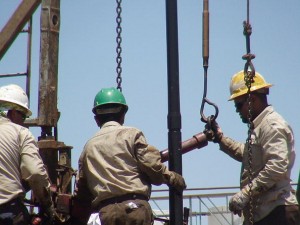Railroad Commission Adopts New Well Construction Rules

Photo by MIRA OBERMAN/AFP/Getty Images
The lead oil and gas regulator in Texas passed new rules for fracking and drilling wells today. (Photo of a Cabot natural gas drill at a fracking site in Pennsylvania.)
The Texas Railroad Commission passed a long-awaited rule on Friday to strengthen the construction of oil and gas wells.
The rule, known as the “well-integrity rule,” passed by a unanimous vote among the three commissioners. It will take effect next January, and will update the commission’s requirements for the process of drilling wells, putting pipe down them and cementing things in place.
“We are sending a strong message to the rest of the states and the federal government that we are doing things right in Texas,” said Commissioner David Porter, in comments shortly before the rule was adopted.
The rule also contains some new requirements for hydraulic fracturing, the water-intensive rock-breaking process that takes place after the well is drilled.
According to a summary of public comments compiled by the Railroad Commission, one drilling company fears that some of the changes in the new rule would add up to $250,000 to the cost of drilling a well in a certain West Texas formation.
But the Texas Oil and Gas Association praised the new rule. “We commend the commission’s efforts because the new rule enhances transparency, reflects advances in technology and is technologically feasible for operators to implement,” Deb Hastings, a vice president of the association, said in a statement.
Environmentalists issued qualified praise for the new rule. “Overall this is a very important rule that sets a higher bar for both traditional and hydro-fracking well drilling and casing,” Cyrus Reed, conservation director of the Sierra Club, said in an email. He said he wished at least one technical aspect of the rule were stronger.
One subtext of the new rule is concern about potential new federal requirements for drillers. Barry Smitherman, the commission chairman, testified before a U.S. Senate committee in Washington on Thursday. He said that some in Congress were wondering whether federal “baseline” standards for hydraulic fracturing were necessary, and he pushed back.
“State regulators are being proactive in regulating this incredible industry, and no federal baseline is necessary because we are the agency closest to the ground,” Smitherman said on Friday.
Reed of the Sierra Club hopes for more work ahead from the Railroad Commission, which also recently updated its water recycling rules for the oilfields. “We hope that this first good step will be part of a general move by the Railroad Commission of Texas to continue to upgrade their rules on injection wells, recycling of water and venting and flaring,” Reed said.

